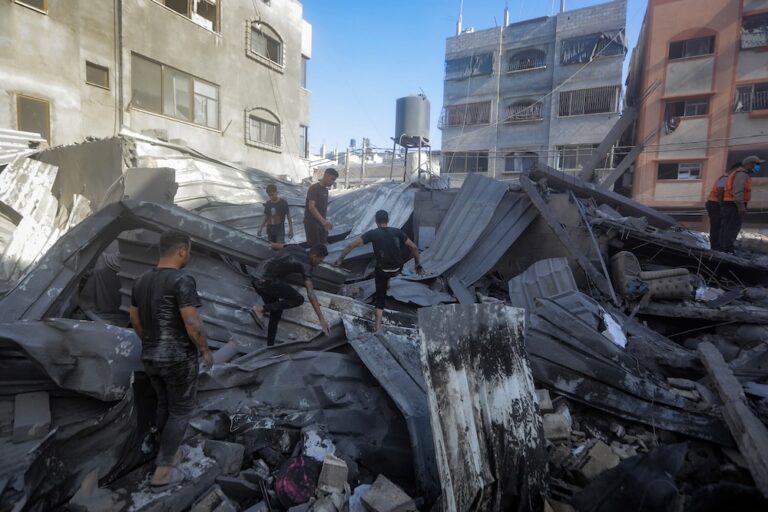(IFJ/IFEX) – The following is a 14 November 2001 IFJ press release: November 14, 2001 Report Condemns ‘Vindictive Campaign’ Against Journalists In Palestine Crisis * Safety Programme Planned after 3 deaths and 43 shootings * Press Card Ban on Palestinian Journalists Condemned * All Sides To Blame for Pressure on Media and Reporters The International […]
(IFJ/IFEX) – The following is a 14 November 2001 IFJ press release:
November 14, 2001
Report Condemns ‘Vindictive Campaign’ Against Journalists In Palestine Crisis
* Safety Programme Planned after 3 deaths and 43 shootings
* Press Card Ban on Palestinian Journalists Condemned
* All Sides To Blame for Pressure on Media and Reporters
The International Federation of Journalists today called for urgent international action to confront “a grave and dangerous climate of confrontation” that threatens journalists and media staff caught up in the Israeli-Palestinian conflict.
The IFJ, the world’s largest group of journalists, has called for assistance to journalists in the region, including providing bullet proof vests to reporters and camera crews and setting up a journalists’ safety centre.
“We have found a spiral of decline that threatens to overwhelm respect for press freedom,” concludes the IFJ report Reporting Palestine: Journalism’s Uncertain Future In the Danger Zone. The IFJ strongly criticises Israel over plans to not recognise Palestinian journalists by banning them from receiving official press accreditation.
“This amounts to a vindictive campaign against reporters who have already suffered heavily in the violence that has followed the launching of a new Intifada last year,” said Aidan White, IFJ General Secretary, who visited Jerusalem and the West Bank with Olivier Da Lage, joint author of the document, a member of the French Syndicat Nationale des Journalistes and a journalist with Radio France Internationale in Paris.
The report says three Palestinian journalists have been killed this year and scores have been injured. Press freedom groups say that there have been 43 shootings of journalists and the vast majority of all attacks, 87 percent, are blamed on Israeli forces. The remaining 13 per cent they say are the responsibility of the Palestinian authorities.
The report also condemns all sides in the conflict for trying to censor and control media. “As the peace process begins to unravel, both Palestinian and Israeli leaders see the manipulation of the media message as a strategic necessity,” says the report, which finds:
– Political interference in media, including confiscation of news material
– Numerous incidents of harassment and violence against journalists
– Arbitrary closures of news organisations and small independent media
– New rules that discriminate against employment of Palestinian media staff and which undermine the professional status of Palestinian journalists
The report makes 12 suggestions for change to ease the crisis facing journalists, including the setting up of a safety centre in Palestinian areas, to provide journalists with practical materials, including bullet-proof vests, helmets and a risk-awareness training programme and humanitarian help to media staff who are the victims of violence.
The report urges a worldwide campaign against attempts to not recognise the professional status of Palestinian journalists and the withdrawal of the Israeli Government Press Office press card.
More must be done, too, they conclude, to strengthen professional solidarity between both Palestinian and Israeli journalists’ groups. The Palestinian Syndicate of Journalists needs to continue its reform process says the report, which calls for more activities to improve levels of representation and effective trade union work. At the same time, the report says that more help should be given to the National Federation of Israeli Journalists to help it confront serious industrial problems that have weakened the organisation in recent years.
The full report and recommendations are available at www.ifj.org/publications/press/pr/265.html
The IFJ represents around 500,000 journalists in more than 100 countries.


